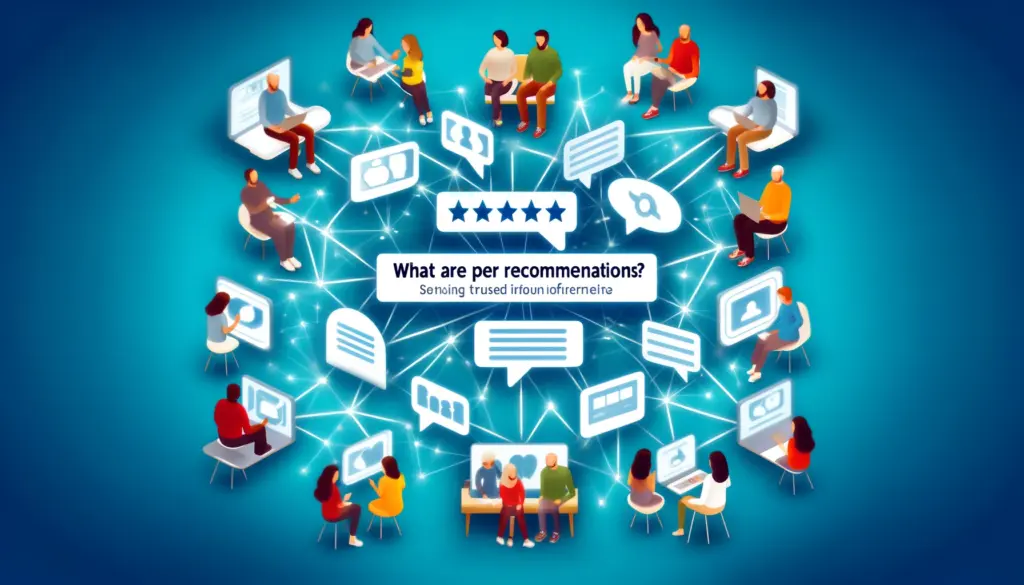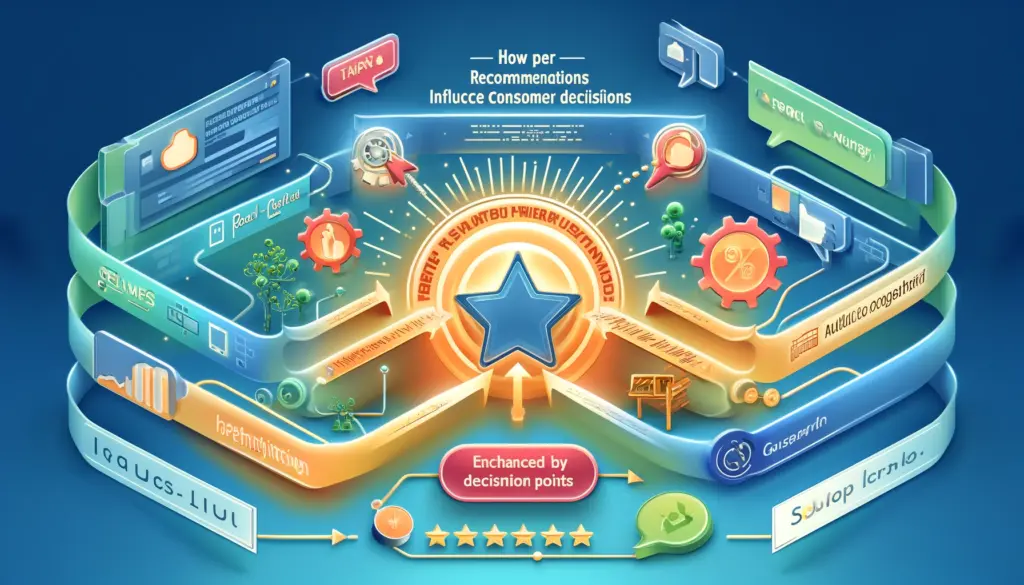In the era of digital consumerism, peer recommendations play a pivotal role in shaping buying decisions. Platforms like Yelp and Trustpilot have become indispensable tools, influencing consumer behavior by providing a wealth of user-generated content.
This article delves into how these platforms, along with online reputation management software like Checkthereviews, impact consumer choices through reviews and ratings.
What are Peer Recommendations?
Peer recommendations refer to the advice or feedback given by individuals who have personally experienced a product or service. These insights are shared across various platforms, including online review sites, social media, and personal blogs. Peer recommendations provide potential customers with real-world evaluations of the quality, performance, and reliability of offerings. This form of social proof leverages the experiences of others to guide decision-making processes, making it a powerful tool in today’s consumer landscape.
The influence of peer recommendations is profound. They can significantly sway purchasing decisions by offering transparency and a sense of trust that traditional advertising methods often lack. For instance, a positive review from a peer can reassure potential buyers about the quality of a product, leading to higher conversion rates. Conversely, negative feedback can serve as a caution, potentially deterring customers if the issues cited are significant and not addressed by the business.

How Peer Recommendations Influence Consumer Decisions?
The impact of peer recommendations on consumer decisions is profound and multifaceted. Here’s a breakdown of how these influences manifest:
- Trust Building: Peer recommendations significantly enhance trust. Consumers are more likely to trust the opinions of other consumers, especially those within their social circles or those who have no direct benefit from promoting a product or service. This trust is crucial in a marketplace where new products and services are constantly introduced.
- Risk Reduction: When making purchasing decisions, especially for higher-priced items or services, potential buyers perceive less risk when they see positive reviews from peers. This can be particularly influential when consumers are deciding between multiple options or when buying from a new or less familiar brand.
- Social Proof: Peer recommendations provide social proof, a psychological phenomenon where people assume the actions of others in an attempt to reflect correct behavior for a given situation. Seeing many positive reviews can trigger a bandwagon effect, encouraging more purchases simply because others are buying and approving the product.
- Personalization and Relevance: Reviews from peers often include personal stories or specific scenarios in which the product was used, which can resonate more deeply with potential buyers than generic marketing content. This personal touch helps consumers visualize how the product might fit into their own lives.
- Increased Engagement: Platforms that facilitate peer recommendations often encourage more consumer engagement. For example, businesses that actively respond to reviews on Trustpilot or Yelp Reviews show potential customers that they care about feedback and are committed to improving service, further influencing purchasing decisions positively.
- Conversion Enhancement: Statistically, products with positive peer reviews see higher conversion rates. For instance, incorporating customer testimonials on sales pages has been shown to increase conversions by significant margins.

The Role of Yelp in Consumer Choices
Yelp has mastered the art of harnessing community-driven content to significantly influence consumer decisions. By encouraging users to share reviews, tips, photos, and videos, Yelp has created a dynamic and comprehensive database that aids consumers in choosing local businesses intelligently. The platform’s strategy focuses on boosting user engagement and ensuring the quality of the content remains high. This commitment sets Yelp apart from competitors like Google Reviews and TripAdvisor, establishing it as a trusted resource for those seeking information about local businesses.
Statistical evidence highlights the power of Yelp’s influence on businesses. For example, improving a Yelp review and rating by just one star can result in a revenue increase of 5-9% for businesses. This substantial impact underscores the importance for businesses to actively manage their online presence and engage with the feedback they receive from customers. Such engagement not only helps improve business services but also solidifies a positive reputation among consumers, leading to increased customer loyalty and potentially higher revenue.

Trustpilot’s Influence on Purchasing Decisions
Trustpilot has built its platform around the principle of openness, allowing anyone to post reviews about businesses at any time. This philosophy promotes a transparent environment where trust and honesty are paramount, helping consumers make well-informed purchasing decisions. By making it easy for users to access and share honest feedback, Trustpilot empowers consumers with the knowledge they need to evaluate products and services before committing to a purchase.
The design of Trustpilot prioritizes the visibility of the most relevant and helpful reviews. This approach ensures that the most informative and useful feedback is readily accessible, fostering an informed community where consumer opinions have a direct impact on business reputations. Furthermore, Trustpilot provides tools for businesses to interact with reviewers. This interaction is crucial as it demonstrates to potential customers how businesses respond to feedback, which can significantly influence consumer perceptions and enhance the reputations of companies.
By actively engaging with customer reviews and addressing feedback, businesses on Trustpilot can improve their services and operational approaches, ultimately leading to better consumer experiences and increased trust. This dynamic of ongoing interaction and improvement is what makes review platforms like Trustpilot invaluable in today’s market, where consumer trust and transparency are more important than ever.

Checkthereviews: Enhancing Online Reputation Management
Checkthereviews, while not as universally recognized as Yelp or Trustpilot, play a crucial role in the arena of online reputation management. This platform helps businesses by providing tools to monitor and manage their digital reputations effectively. By aggregating feedback from various review platforms, Checkthereviews offers a comprehensive view of consumer opinions, making it easier for businesses to get a holistic understanding of their public perception across the internet.
Comprehensive Feedback Aggregation
One of the key features of Checkthereviews is its ability to pull together reviews and feedback from multiple sources. This aggregation allows businesses to see a consolidated view of their reputation across different platforms. Such a broad perspective is invaluable, as it enables businesses to identify common themes and issues cited by customers, which might require attention. By integrating this feedback, companies can prioritize areas for improvement based on recurring feedback from different sources.
Proactive Reputation Management
The platform facilitates proactive reputation management by allowing businesses to respond quickly to feedback. This responsiveness is critical in maintaining a positive public perception and can significantly impact customer loyalty and potential revenue. For instance, addressing a negative review promptly can mitigate its impact and sometimes even turn a dissatisfied customer into a loyal advocate. This swift response capability underscores the importance of real-time monitoring and engagement tools provided by platforms like Checkthereviews.

Analytics and Insights
Beyond merely collecting reviews, Checkthereviews offers analytical tools that help businesses understand trends in the feedback. These analytics can provide insights into customer satisfaction and sentiment over time, highlighting improvements or declines in service levels. Such data is crucial for strategic decision-making, allowing businesses to align their operational or marketing strategies more closely with customer expectations and experiences.

Strengthening Business-Customer Relationships
By using Checkthereviews, businesses can also demonstrate their commitment to transparency and customer care. This demonstration is increasingly important in a digital age where consumers value honesty and responsiveness. Engaging with reviews and feedback publicly helps build trust and can strengthen the relationship between businesses and their customers.
Conclusion
In conclusion, Yelp and Trustpilot, along with tools like Checkthereviews, significantly influence consumer decisions in today’s digital marketplace. They empower consumers with information to make better choices and offer businesses a platform to build trust and engage with their clientele. However, the effectiveness of these platforms depends on their ability to maintain the authenticity and relevance of the reviews they host. As digital consumerism evolves, these platforms must continually adapt to ensure they effectively serve both businesses and consumers in a transparent and trustworthy manner.
